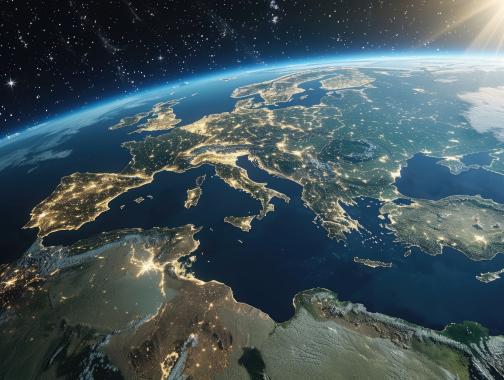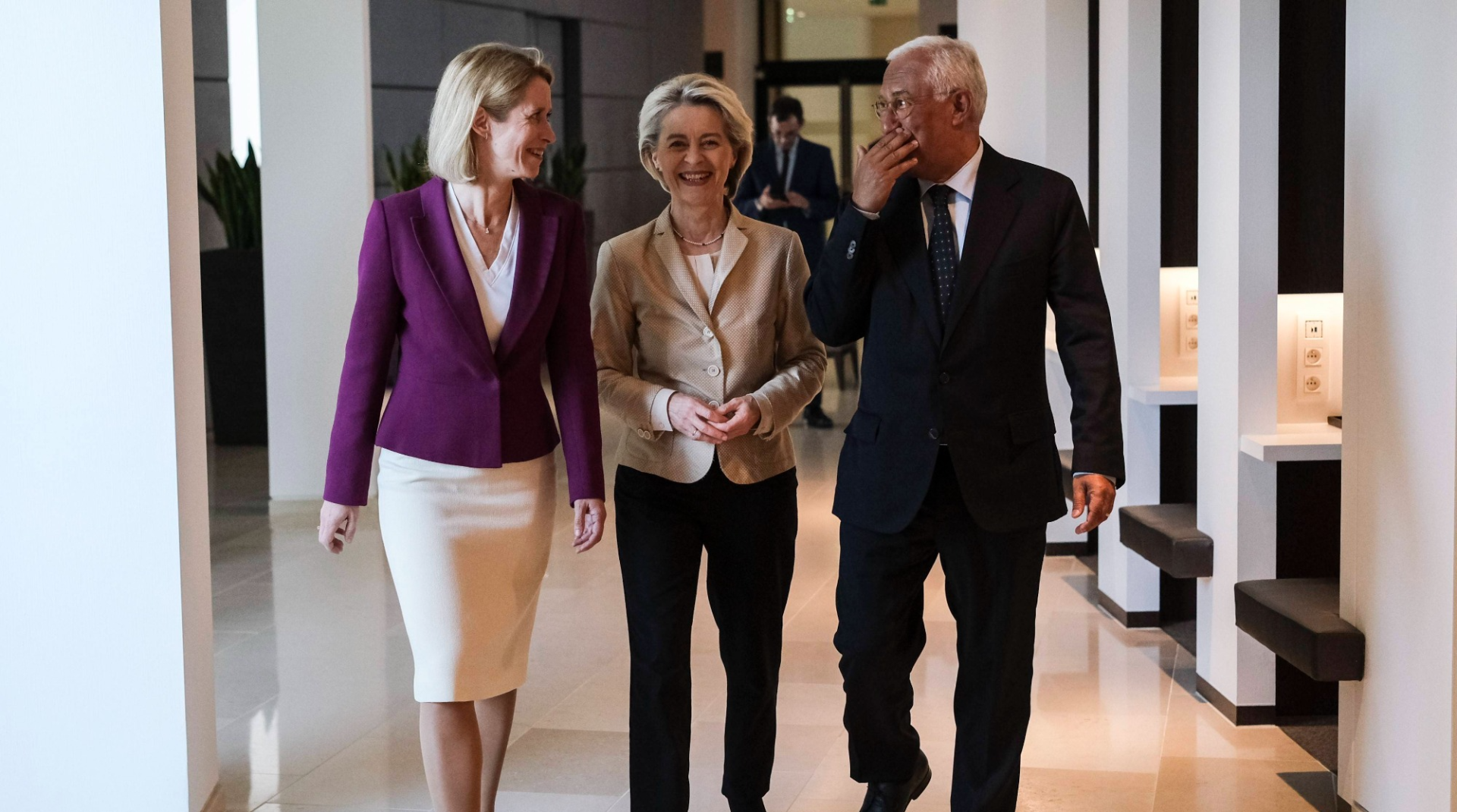Asset Publisher
Obituary
We mourn the loss of our Honorary Chairman Prof. Dr Bernhard Vogel
The former Minister President of Rhineland-Palatinate and Thuringia died at the age of 92.
Learn moreGlobal Europe Illustrated
Resolutions in the European Parliament on Venezuela
The European Parliament voted on Venezuela in September 2024 and January 2025, with different resolutions. In the January resolution, MEPs called for expanded sanctions.
Learn moreCountry report
The EU and its global partners in a new legislative period
Ursula von der Leyen is striving for a geopolitical EU strategy with more influence and pragmatic partnerships. What changes are in store?
Learn moreGeopolitics and Connectivity Take the Center Stage at the Fir...
Geopolitics and Connectivity Take Center Stage at EU-GCC Summit
The first ever EU-GCC Summit on 16 October 2024 served as a pivotal moment for both the European Union and the Gulf Cooperation Council (GCC).
Learn moreElections in Africa: Members of the Democrat Union of Africa
Global Europe Illustrated: Members of the Democrat Union of Africa and the recent electoral results
The Democrat Union of Africa (DUA), founded in 1997 in Dakar, Senegal, is an alliance of centre-right political parties across Africa.
Learn moreStrategic Partnerships – The EU’s Critical Raw Materials Act
Global Europe Illustrated: Strategic Partnerships – The Heart of EU’s Critical Raw Materials Act
The second map of Global Europe Illustrated showcases the strategic partnerships that form the core of the European Union's Critical Raw Materials Act (CRMA).
Learn moreAsset Publisher
Welcome
We are a bridge-builder between the EU and the Global South. We implement and facilitate multi-stakeholder dialogue on sustainable development, with a focus on the nexus of democracy and governance, peace and security, climate and energy. Follow us @ linktr.ee/MDPD
Asset Publisher
Media library
Please click here to view contents.
Or adjust your cookie settings under privacy policy.#KAS4Youth - Full series on YT & IGTV - @linktr.ee/MDPD
“Young Voices - Perceptions on the EU’s global engagement” - #3 Palestine
The campaign aims to critically analyse the EU's role in the world through the eyes of young people in the Global South, who are engaged in their communities through EU programmes.
Please click here to view contents.
Or adjust your cookie settings under privacy policy.#KAS4Youth - Full series on YT & IGTV - @linktr.ee/MDPD
“Young Voices - Perceptions on the EU’s global engagement” - #2 Argentina
The campaign aims to critically analyse the EU's role in the world through the eyes of young people in the Global South, who are engaged in their communities through EU programmes.
Please click here to view contents.
Or adjust your cookie settings under privacy policy.@kas.mnedbrussels - @KAS.PDA - Asian Women Parliamentarian
#26 Malaysia - "Women's Political Participation. The State of Play in Asia" (3/3)
The advocacy campaign promoted by MDPD KAS in Brussels and AWPC aims to raise awareness about the situation of women parliamentarians in Asia.
Please click here to view contents.
Or adjust your cookie settings under privacy policy.#KAS4Youth - Full series on YT & IGTV - @linktr.ee/MDPD
“Young Voices - Perceptions on the EU’s global engagement” - #1 Morocco
The campaign aims to critically analyse the EU's role in the world through the eyes of young people in the Global South, who are engaged in their communities through EU programmes.
Please click here to view contents.
Or adjust your cookie settings under privacy policy.@kas.mnedbrussels - @KAS.PDA - Asian Women Parliamentarian
#24 Malaysia - "Women's Political Participation. The State of Play in Asia" (1/3)
The advocacy campaign promoted by MDPD KAS in Brussels and AWPC aims to raise awareness about the situation of women parliamentarians in Asia.
Please click here to view contents.
Or adjust your cookie settings under privacy policy.@kas.mnedbrussels - @KAS.PDA - Asian Women Parliamentarian
#25 Malaysia - "Women's Political Participation. The State of Play in Asia" (2/3)
The advocacy campaign promoted by MDPD KAS in Brussels and AWPC aims to raise awareness about the situation of women parliamentarians in Asia.
Please click here to view contents.
Or adjust your cookie settings under privacy policy.@kas.mnedbrussels - @KAS.PDA - Asian Women Parliamentarian
#23 Taiwan - "Women's Political Participation. The State of Play in Asia" (3/3)
The advocacy campaign promoted by MDPD KAS in Brussels and AWPC aims to raise awareness about the situation of women parliamentarians in Asia.
Please click here to view contents.
Or adjust your cookie settings under privacy policy.@kas.mnedbrussels - @KAS.PDA - Asian Women Parliamentarian
#22 Taiwan - "Women's Political Participation. The State of Play in Asia" (2/3)
The advocacy campaign promoted by MDPD KAS in Brussels and AWPC aims to raise awareness about the situation of women parliamentarians in Asia.
Please click here to view contents.
Or adjust your cookie settings under privacy policy.@kas.mnedbrussels - @KAS.PDA - Asian Women Parliamentarian
#21 Taiwan - "Women's Political Participation. The State of Play in Asia" (1/3)
The advocacy campaign promoted by MDPD KAS in Brussels and AWPC aims to raise awareness about the situation of women parliamentarians in Asia.
Please click here to view contents.
Or adjust your cookie settings under privacy policy.@kas.mnedbrussels - @KAS.PDA - Asian Women Parliamentarian
#20 Taiwan - "Women's Political Participation. The State of Play in Asia" (2/2)
The advocacy campaign promoted by MDPD KAS in Brussels and AWPC aims to raise awareness about the situation of women parliamentarians in Asia.
Asset Publisher
Asset Publisher
Asset Publisher
Current publications

Reconceptualizing conflict and cooperation over energy in the East Mediterranean
Harry Tzimitras - Professor of International Law and International Relations and Director at PRIO Cyprus Centre
-
February 25, 2025
-
European Union Climate and Energy

Global Europe Illustrated: Resolutions in the European Parliament on Venezuela
-
Dr. Olaf Wientzek
-
January 24, 2025
-
Global Europe Illustrated

Global Europe Illustrated: EU Member States voting on Tariffs - EV China
-
Nicole Linsenbold, Dr. Olaf Wientzek
-
December 16, 2024
-
Global Europe Illustrated







